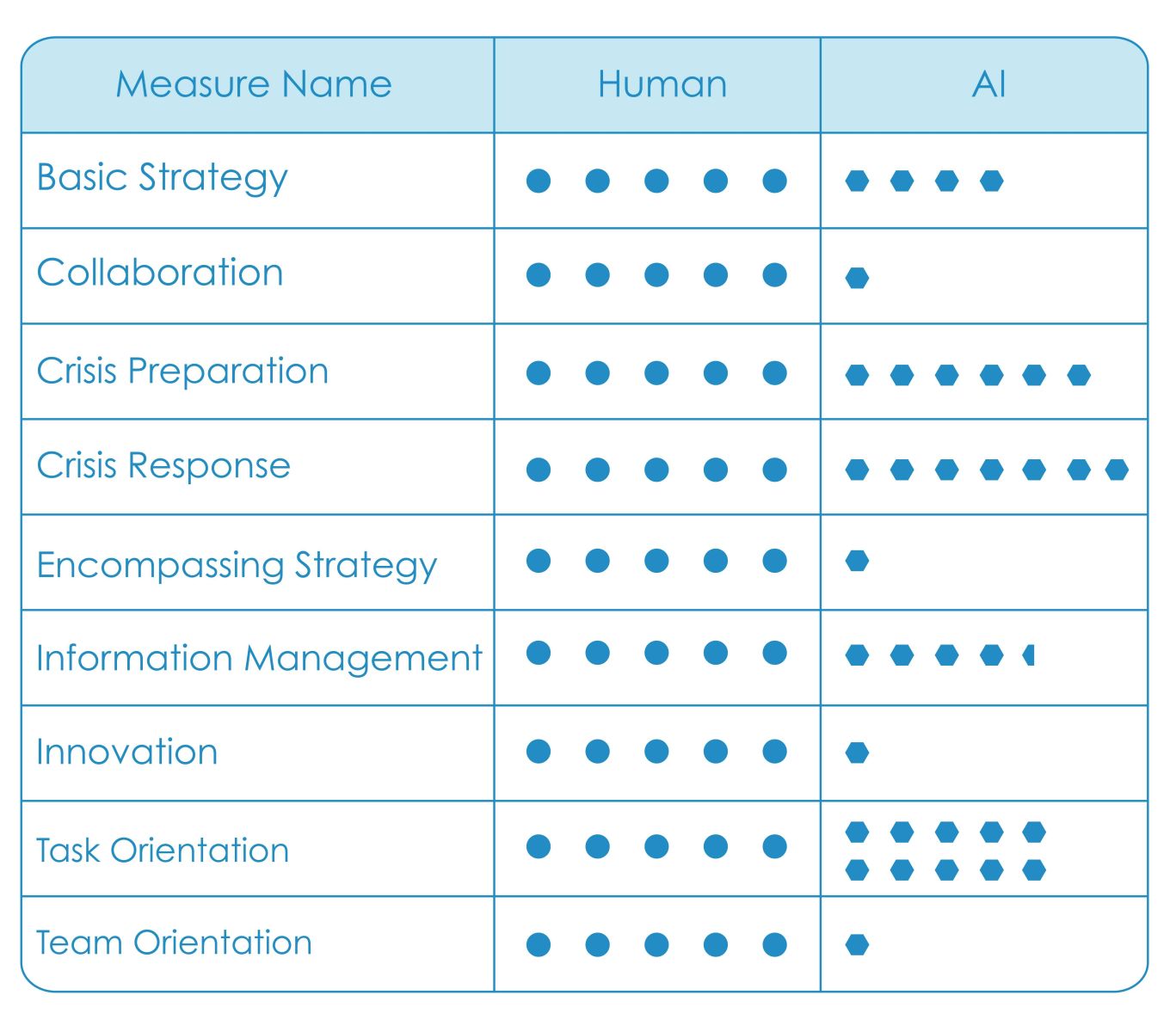In an era of instant global connectivity, actions have increasingly long-ranging and seemingly random consequences. From a single social media post by one person sparking a revolution to an act of courage by one child changing worldwide policies, events continually unfold in chaotic and unpredictable ways.
There is a surprising and illuminating parallel between the chaotic cause and effect we see in our everyday lives and the foundational basis for human thought and action. The neuronal nets we rely on for cognitive processing are also fundamentally random, nonlinear and chaotic. The AI systems we are starting to incorporate rapidly into our work streams are a stark contrast. While they are growing into aspects of non-linearity, the pure chaos and randomness of the human experience are not mirrored by AI at this time.
It is striking that given this dichotomy, organizations today are seeking leaders who think in integrative ways that encompass the full expanse of roles and functions, leaders who can navigate transformation smoothly and demonstrate emotional resilience- all capabilities that exist fully outside of the enormous realm of possibility that AI has to offer today.
For example, companies are seeking leaders who can thrive beyond a single function or conventional way of thinking about a role. The ability to weave business and cultural priorities between different teams and functional groups cannot be driven by AI. Rather, leaders can leverage AI for inputs into processes that dynamic leaders can build upon. In addition, in a time where emotional intelligence and empathy are considered table stakes for success in leadership, AI has yet to decipher the nuances of understanding how people display empathy toward their teams and organization, respond to situations and construct solutions and respond to others and the market. These are nuances not yet addressed by AI and are in high demand among executives and executive hiring.
Where AI May Go (and Where It May Not)
AI is poised to reinvent a wide array of functional and integral competencies – from copywriting to market analysis. The internet is crowded with “how to use AI” guides, and it is impossible to think of a corner of global industry where AI has not appeared as a potential catalyst for change. This is not one of those guides: instead, we are experts in human cognition and leadership who are primarily interested in how individuals can build their own skill sets to remain relevant and drive critical decision making at an organizational and global scale in an age of AI.
In order to fully understand where AI may provide the greatest benefit to human performance and decision-making, it is imperative to begin by understanding human and AI performance. To do this, we utilized the Meseekna Simulation System. For the past 50 years, the Meseekna simulation system has been used to assess and quantify the process of thinking. The most elite decision-makers in the world, from astronauts and military generals to CEOs of multinational companies and presidential candidates, have had their thinking measured by the simulation system. The simulation system, first developed in a research laboratory, is richly validated by double-blind controlled experiments and over 500 peer-reviewed publications. The simulation system is a sophisticated and trusted method to measure cognition under a wide variety of situations, including studies with conditions of medication, alcohol, head injury, daylight and varied air quality.
As part of the ongoing debate over what it would actually take for an AI system to replace human functioning, we chose to have ChatGPT run through a series of simulations that we have run with large populations of individuals to assess critically and quantitatively how AI functioning and human functioning still differ- and using that data, understand the places in which AI can be most beneficial, and where it may struggle to replace human intelligence yet.
We had ChatGPT experience two different scenarios: a geopolitical scenario and a science fiction scenario. In our simulation runs with ChatGPT, we chose to look at the following nine parameters of productivity: basic strategy, collaboration, crisis preparation, crisis response, encompassing strategy, information management, innovation, task orientation and team orientation.
ChatGPT outperformed human capacity in both crisis response and crisis preparation. Due to the rapid processing speed and significant reservoir of information, AI was able to quickly and systematically respond to crisis situations, as well as identify possible crisis points well in advance of a crisis. This was aided by an exceptional ability to focus on the task at hand and respond specifically to the task. ChatGPT significantly outperformed humans on task orientation.
Interestingly, ChatGPT was within human capacity of the brightest humans in areas of information management (sourcing, vetting, utilizing and disseminating data). Despite the clear advantage in the amount of information access that AI has, it appears that human instincts with regard to pulling relevant information at the right time are highly valuable for performance.
While ChatGPT is excellent at basic strategy (“if I do A, I can do B and then do C,” a linear step-by-step strategic plan), ChatGPT struggles with encompassing strategy (“if I do A, and B occurs, then I can do C,” a nonlinear dynamic global strategic plan). Further, ChatGPT performed poorly along parameters of innovation, another nonlinear thinking path.
ChatGPT had a clear decrease in performance when it came to people skills, such as collaboration and team orientation. While ChatGPT can suggest relevant actions to help people in a crisis, it does so with a startling lack of collaborative effort- suggesting top-down, command-style actions, and largely ignores actions that would build teams such as sharing praise or communicating information in an effective manner. While AI is responsive to every stimulus and makes more decisions than an average human; it does lack the granularity and scope of thought processes that are characterized by team orientation, encompassing strategy or collaboration.
Right now, we see that there are areas in organizational leadership where humans have a stronger inherent capacity than artificial intelligence. This mirrors our experiences in talent management. Today, we see organizations seeking leaders who exemplify transformative thinking. These are leaders who build a company with a balanced future in mind, having seen both periods of economic uncertainty and extraordinary growth. These are leaders who are highly strategic- identifying, evangelizing and executing a transformative vision for the organization, creating material impact to the business. These are leaders who are highly collaborative, possessing the humility and intuition to authentically collaborate with peers in order to drive streamlined decision-making, better supporting the bottom line and creating solutions with breadth. These are leaders who are exceptional at communicating to their teams and leading with empathy during crisis preparation, management and recovery, having the experience of staying in organizations long enough to be a part of inevitable corporate transformation within a business or those who have built resilience through restructuring organizations through a crisis.
How To Develop Your Skills to Rise Beyond AI
The leaders who will stand out and rise to the top in this new age of AI are the leaders who focus with intention on the skills that make us uniquely human: building consensus, integrating diverse perspectives, developing empathy and maintaining a holistic global view. These leaders will be differentiated and more positioned to lead as a strong complement to AI within an organization.
There are many different ways to cultivate each of these traits, however, for simplicity’s sake, we have identified a few ways that can support rapid gains in these areas.
- Take responsibility and ownership for creating points of cohesiveness and integration within your organization.
- Understand the limitations of your scope and role, but work beyond that to complement specific areas where you think AI could play a larger role. Create a list of what you think you, your team or immediate peers could accomplish if you were not limited by the hours of a day. Audit that list with the lens of AI tools available on the market and build opportunities for value creation.
- Create a practice of developing empathy through experiences that have the ability to transport you from your ordinary life into someone else’s shoes. Whether it is through watching a documentary, reading a book, or listening to a podcast, make room for imagining other lives to develop your sense of empathy.
- Bring diversified thinking to the table. Surround yourself with non-linear ways of thinking, living and leading. Develop opportunities to engage with fellow leaders from different arenas and walks of life. Be mindful in creating connections with individuals who read different media, live in different places and most importantly, think differently from you.
- Develop a holistic global view by paying attention to the democratization of AI. With the understanding that AI poses a fundamentally more complex path to onboard larger populations than the Internet did, leaders who have a thoughtful and compassionate grasp of how to be accountable and responsible for all communities to thrive in their jobs while complementing the increasing presence of AI.
Special thanks to Colin O’Connor, Art Director at Meseekna, for the artwork.
Topics Related to this Article






